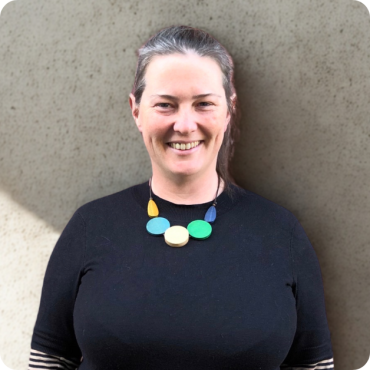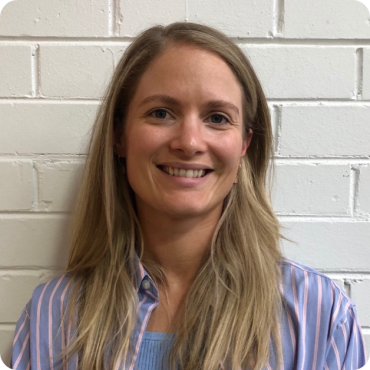Dr Sarah Trobe
National Director
Sarah (She/her) is the National Director of NEDC, leading a team which develops and implements consistent national standards for the prevention and treatment of eating disorders. Sarah is a Clinical Psychologist and has held clinical positions at the Royal Children’s Hospital and private practice as well as working with The Victorian Centre of Excellence in Eating Disorders (CEED) with a focus on service development, case consultation, multidisciplinary care coordination, and education and training provision. Sarah’s interests lie in the link between physical health and mental health and current care structures in this field, and she is passionate about setting up strong treatment networks and systems across the country. Sarah guides and supports all of NEDC's work, is leading the implementation of the National Eating Disorders Strategy 2023-2033, and provides expertise into workforce development initiatives.
Dr Emma Spiel
Workforce Development Lead
Emma (she/her) is NEDC’s Workforce Development Lead. Emma supports the NEDC team and facilitates implementation of the National Strategy by leading and consulting on workforce development strategy and initiatives to drive the development of a workforce of adequate size, skill, and diversity positioned across the system of care to meet the needs of all people at risk of or experiencing an eating disorder and their families/supports and communities. Emma trained as a Clinical Psychologist and has held clinical and supervisory positions across private and public settings. She has led projects and activities aimed at supporting sustainable, integrated and evidence-informed service development initiatives, and draws on a skillset in implementation and evaluation to facilitate data-driven, strategic, and coordinated workforce development. Emma has lived experience of an eating disorder and is deeply motivated to help build systems and services that support all people experiencing or at risk of an eating disorder to receive the care they need. She has a strong interest in the intersection between food, eating, bodies and gender, neurotypes and marginalised groups and identities and in the structural and systemic influences on people's experience of their body, and how workforce initiatives can help drive change in these areas. Emma will be continuing to support the embedding of eating disorder content within tertiary curricula, overseeing workforce development in the Right Care Right Place project and continuing to consult to the sector and develop resources to build the workforce across the Stepped System of Care.

Louise Dougherty
Strategy and Policy Lead
Louise (she/her) is NEDC’s Strategy and Policy Lead. Louise has a Master of Public Health and has worked in applied research and policy roles for over a decade. Her work has focused on improving health care access and outcomes through systems change. Alongside her system lens, Louise brings an empathetic and understanding approach to her work, recognising the profound impacts of eating disorders on individuals and their families. Louise has lived experience of an eating disorder and is passionate about contributing to the development of an equitable and accessible system of care for the prevention and treatment of eating disorders for all Australians.Louise co-led and co-wrote the National Eating Disorders Strategy 2023-2033. In 2025, Louise is supporting the ongoing implementation of the National Strategy, helping to drive action at a national and state level.

Hilary Smith
Health Promotion Lead
Hilary (any pronouns) is NEDC’s Health Promotion Lead. Hilary has worked in health and human services for over 20 years in service delivery, management, policy, strategy, sector development and business development roles. Hilary holds a Master of Health Promotion and has a keen interest in health equity and preventative health action across systems and sectors. Hilary is particularly interested in understanding how social determinants of health can prevent eating disorders at both the individual and population level. She is particularly motivated to drive approaches to eating disorder prevention and harm minimisation based on her own lived experience as a neurodivergent person with a previous longstanding eating disorder. Hilary currently leads the project to develop and implement the "Eating Disorder Safe" principles, which will be applied across public policy, research, health service delivery, education and other settings. This includes ensuring a focus on culturally safe and relevant approaches and outcomes.

Evangeline Gardiner
Right Care Right Place Evaluation Support Coordinator
Evangeline (She/her) is the Right Care Right Place Evaluation Support Coordinator. Evie has a background in public health, graduating from the University of Sydney in 2021 with a Master of Public Health. She has experience working in public health research, contributing to the COVID-19 response in NSW before moving into the mental health research space. Evie has previously held research positions at the University of New South Wales and at the National Centre for Immunisation Research and Surveillance (NCIRS). Evie has lived experience of weight stigma and body image concerns and is passionate about contributing to an equitable system of care for all individuals who are experiencing, or at risk of, eating disorders, regardless of their size.

Kirstin Riedmaier
Projects and Operations Coordinator
Kirstin (She/her) is NEDC's Project and Operations Coordinator. Kirstin is a dedicated and results-oriented professional with a background in project coordination, operations management, and a passion for supporting community-driven initiatives. Kirstin supports a diverse team in executing impactful projects, ensuring they are delivered on time, within budget, and to the highest standards. She is adept at project monitoring, budget oversight, and process improvement, contributing to a smooth, effective workflow that empowers the NEDC team to focus on outcomes. Kirstin's previous experience includes roles in finance coordination, education, and customer service. She has led educational initiatives aimed at raising awareness about eating disorders. With a Master’s degree in Dietetics and a background in Health Science, Kirstin combines her academic expertise with hands-on experience to drive change and make a meaningful impact. Kirstin is committed to supporting systems change and improving supports for people experiencing or at risk of an eating disorder. Kirstin is motivated by contributing to an organisation that values compassion, community, and positive change for people with eating disorders. With a nurturing and respectful approach to every task, 2025 will see Kirstin continue to foster positive relationships while maintaining a keen focus on project delivery- supporting National Strategy implementation, team support, and operational efficiency at NEDC.

Melissa Roberts
Communications Coordinator
Melissa (She/her) is NEDC's Communications Coordinator. In this role, she leads and coordinates NEDC’s communications activities, encompassing website design and content, document design, social media, and member and stakeholder engagement strategies. Her work ensures that evidence-based information is presented in ways that are accessible and engaging for people with lived experience, clinicians, researchers, and the general public across diverse settings. Melissa holds a Bachelor of Media and Communications with a major in Journalism. She brings experience in the not-for-profit sector, as well as a background in customer service, content creation, and brand representation. Melissa is driven by a deep passion for people and connection, and her career in communications reflects a strong commitment to supporting others and contributing to meaningful social change. In 2025, Melissa is involved in delivering a wide range of communications initiatives, including digital campaigns, social media, workforce engagement, and the development and promotion of new resources aligned with the National Strategy.
Gabrielle Orr
Workforce Development Coordinator
Gabrielle Orr (she/her) is NEDC's Workforce Development Coordinator, where she plays a key role in implementing workforce-related standards and actions outlined in the National Strategy. Gabrielle is an Accredited Practicing Dietitian and has worked across public health, health promotion, clinical practice, and community settings in both Australia and Aotearoa (New Zealand). She led the development of Australia’s first Size Inclusive Health Promotion guideline and has worked in a range of community settings to promote size inclusive practice. Clinically, her experience spans working with children, young people, and their families, including working with children with or at risk of eating disorders. Gabrielle is dedicated to supporting environments that enable positive relationships with food and body image for individuals and communities. She is also strongly driven to reflect on and challenge the systems that perpetuate stigma and marginalisation, while upholding values of inclusion and self-determination in all aspects of her work. At NEDC, Gabrielle is supporting the development of the Workforce and Professional Development Hub. She will also be overseeing the NEDC Core Skills eLearning modules and drawing on her resource development skills to launch the Higher Weight Guideline eLearning and ED-Safe eLearning modules.
Dr Sarah Giles
Research and Evaluation Lead
Sarah (she/her) is NEDC’s Research and Evaluation Lead. In this role, Sarah is responsible for overseeing the implementation of the Evaluation Framework for the National Strategy. She also supports the delivery of other NEDC projects by providing research support to ensure that NEDC activities and outcomes are measured and informed by contemporary best practices and emerging perspectives. Sarah holds a Master of Clinical Psychology and a PhD from the University of Melbourne. She has previously held research positions at the Murdoch Children's Research Institute and the University of Melbourne. Her research has examined psychological processes that may predispose individuals to poorer treatment outcomes for eating disorders, such as obsessive-compulsive traits and autism. Sarah has also conducted research exploring the mental health needs of young people with disabilities and the wellbeing of caregivers. Sarah is deeply passionate about improving outcomes for individuals struggling with eating disorders, driven by her belief that solutions must be both effective and person-centered. With a strong commitment to advocating for those whose voices are often overlooked, Sarah recognizes the invaluable role that lived experience plays in shaping treatments that truly meet the unique needs of individuals. She believes that by integrating personal perspectives into research, we can better understand the complexity of eating disorders, break down stigmas, and provide more empathetic, tailored support. This year, Sarah will be finalizing the Evaluation Framework for the National Strategy and overseeing the implementation of NEDC’s internal evaluation strategy.

Amy Woods
Workforce Development & PHN Coordinator
Amy (she/her) is NEDC's Workforce Development and PHN Coordinator. She has a primary focus on building the engagement of the Primary Health Network's across Australia, supporting them to champion the National Eating Disorder Strategy and supporting both the PHN workforces and the broader workforce to feel confident and passionate about working with people with eating disorders and their supports. Amy is PACFA registered counsellor and lived experience advisor living and working on Wurundjeri land. She has completed a Bachelors in Counselling, a Graduate Certificate in Forensic Behavioural Science and is a Doctoral Candidate at Latrobe University exploring the experience of eating disorders in the incarcerated population. Amy has previously worked as the Wellbeing Program Coordinator and Telehealth Services Manager at Eating Disorders Victoria, Senior Lived Experience Advisor at the Centre of Excellence in Eating Disorders and as the Clinical Supervisor to the National Helpline at the Butterfly Foundation. She also has experiences working in general adult mental health and youth residential care. Amy is passionate about individualized, neuro-affirming and LGBTQIA+ safe care and amplifying the diverse voices of lived experience. Amy uses her lived experience to inform the work she does, whilst keenly listening to the voices of the broader lived experience community. She see's great strength in embedding lived experience into all levels of care and leadership within the mental health sector, and particularly the eating disorder sector. In her private practice she blends lived experience support with evidence based clinical care, merging two areas that are typically separated and siloed. In 2025 Amy will be working to build on the established relationships with the PHN's across Australia, contributing to the development and delivery of resources and training, whilst also providing her clinical and lived experience expertise to the broader operations of NEDC.

Jackie Wilson
Project Manager - Right Care Right Place
Jackie is the Right Care Right Place (RCRP) Project Manager at NEDC. As a Clinical Psychologist with experience across public, private, and academic settings, Jackie brings a deep understanding of the eating disorder service system and the complex challenges faced by individuals, carers, and clinicians. She has worked with people across the lifespan experiencing a wide range of mental health concerns, and has a passion for supporting those navigating eating and feeding disorders.
As RCRP Project Manager, Jackie leads work to strengthen pathways to safe, coordinated, and evidence-informed care for people experiencing eating disorders across Australia. She is passionate about building systems that reflect the realities of help-seeking and care delivery - supporting early intervention, collaboration across sectors, and locally tailored responses.
Alongside her clinical background, Jackie brings experience in workforce development, supervision, and education. She is committed to ensuring the voices of people with lived and living experience are embedded in all aspects of system and service design.

Phoenix Southall
Communications Support Officer
Phoenix is the Communications Support Officer at NEDC, supporting the delivery of NEDC’s communications across digital design, content creation and stakeholder engagement. Her work focuses on making information engaging, accessible and appropriate for diverse audiences and platforms.
Phoenix holds a Bachelor of Communication in Media Arts and Production and Social and Political Science, and brings experience across the not-for-profit, state, commercial and creative sectors. She is driven by thoughtful, audience-informed storytelling that supports education, health, arts and cultural services.

Emma Halloran
Project Implementation Officer
Emma is the Project Implementation Officer at NEDC, supporting the implementation of the National Eating Disorders Strategy. She is passionate about fostering more interconnected systems to improve consumer experience in navigating our complex health system. She strongly believes in a patient centred approach to untangle messy systems to create clearer, more coordinated pathways to care.
Emma is a project management practitioner who has previously worked on groundbreaking projects in various health setting over the past nine years. This includes a transformation project at The Royal Melbourne Hospital, establishing nurse-led clinics as a new model of care and developing a community exercise maintenance program as a continuum of care for consumers with pulmonary and cardiovascular disease. She also led the development of a three-year National Strategy Framework to deliver increased equity and access to pulmonary rehabilitation services across Australia.
Emma has also led the development of healthcare resources including a comprehensive tool kit for physiotherapists and exercise physiologists to support the safe delivery of pulmonary rehabilitation within evidence-based clinical guidelines. She also developed a web site resource to support nurses in establishing a nurse-led clinic to address service gaps within their local community.





